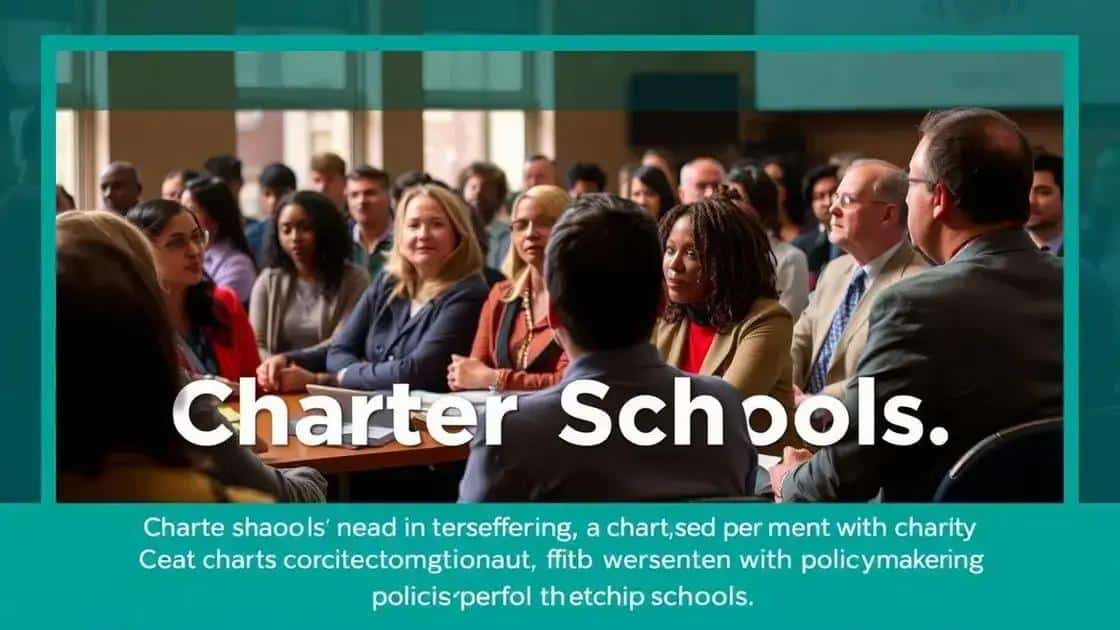Charter school debate reignites discussions on education

Anúncios
The charter school debate reignites discussions on the effectiveness, funding disparities, and the impact of these independent public schools, highlighting both their successes and challenges in the educational landscape.
Charter school debate reignites conversations surrounding education reform and school choice, prompting us to think about what truly benefits our children. Are we focusing on quality, accessibility, and inclusivity? Let’s delve deeper into this complex issue.
Anúncios
Understanding charter schools and their impact
The concept of charter schools is becoming a major topic in education today. Understanding what they are and how they function can help parents make informed decisions about their children’s education. Charter schools operate independently but are publicly funded, aiming to provide alternatives to traditional public schooling.
What Are Charter Schools?
Charter schools are unique in that they are granted more flexibility in their operations compared to traditional public schools. This flexibility allows them to create innovative curriculums and educational approaches. However, they are also held accountable for academic performance.
Anúncios
Benefits of Charter Schools
- Increased choice for parents and students
- Specialized programs that cater to specific interests
- Potential for higher academic performance
- More hands-on learning opportunities
While charter schools present various benefits, there are arguments against them. Critics claim that they can divert funds from traditional public schools, which may affect the overall quality of education in the community. Additionally, the admission processes can sometimes favor families who are already more involved in their children’s education.
Understanding the impact of charter schools requires examining both sides of the debate. Some studies show that students in charter schools may perform better academically. Others highlight the disparities in funding and access, especially in low-income areas.
Charter School Performance
Research reveals that the performance of charter schools can vary significantly. Some excel and provide excellent educational opportunities, while others struggle to meet the needs of their students. This inconsistency raises important questions about the governance and oversight of these institutions.
Challenges Faced by Charter Schools
- Funding limitations and competition with traditional schools
- Accountability standards that can vary by state
- Public perception and community support
- Recruitment and retention of qualified teachers
In conclusion, charter schools represent a complex landscape within the education system. Evaluating their impact involves considering various perspectives to understand both the potentials and challenges they introduce into the educational ecosystem.
Key arguments for and against charter schools

The debate surrounding charter schools is vibrant, with passionate voices on both sides. Understanding the key arguments for and against charter schools can help us grasp the complexity of this issue.
Arguments in Favor of Charter Schools
Supporters of charter schools argue that these institutions offer essential choices for families. They suggest that charter schools can promote innovation in education by allowing different teaching methods and curriculums.
- Increased parental choice in schooling options
- Enhanced focus on specialized programs like arts or STEM
- Possibility for smaller class sizes
- Accountability to parents and the community
These aspects can lead to tailored educational experiences that meet individual student needs. Proponents believe that competition from charter schools can drive improvements in traditional public schools.
Arguments Against Charter Schools
On the other hand, critics raise valid concerns about charter schools. They argue that these schools can divert funds from traditional public schools, potentially harming students who remain in those systems.
- Funding disparities affecting public school budgets
- Selective admissions processes that may exclude some students
- Variability in quality and academic performance
- Lack of regulation and oversight in some areas
Such issues can lead to inequities in educational access and outcomes, raising questions about the overall impact of charter schools on the community. It’s important to evaluate how these arguments play out in different regions and contexts.
Both sides present compelling points that warrant consideration. Understanding the key arguments for and against charter schools not only informs our views but also guides discussions about the future of education.
Case studies: Successful and struggling charter schools
Examining case studies of charter schools can reveal important insights into their successes and challenges. These examples provide a clearer understanding of how various factors contribute to the performance of these institutions.
Successful Charter Schools
Some charter schools have achieved notable success. They often focus on student-centered learning, innovative teaching strategies, and strong community involvement. This approach allows them to cater to the unique needs of their students.
- Success Academy: Known for its high academic standards, this network emphasizes rigorous academics and strong parental involvement.
- KIPP (Knowledge Is Power Program): With a focus on character development and staff training, KIPP schools have led their students to gain significant academic growth.
- Tepper Foundation Schools: These schools implement individualized learning plans that enhance student engagement and improve outcomes.
Schools like these have demonstrated that with the right strategies, charter schools can lead to remarkable educational improvements.
Struggling Charter Schools
However, not all charter schools experience the same level of success. Some face significant hurdles such as funding issues, lack of resources, and high turnover of staff. These challenges can hinder educational quality and student performance.
- Green Dot Public Schools: Despite a commitment to serving low-income communities, some campuses have struggled with low test scores and student retention.
- Academy of Language and Learning: This school faced criticism for its inconsistent teaching methods and inability to meet state standards.
- Charter Network XYZ: With high enrollment numbers, this network has been criticized for not providing adequate support to its teachers and students.
The stories of struggling charter schools highlight the need for effective oversight, community support, and sustainable funding to ensure all students have access to quality education. These case studies serve as valuable lessons for policymakers and educators alike, emphasizing the importance of continual assessment and improvement in the charter school sector.
The future of education: Trends and predictions

The future of education is evolving rapidly. Understanding upcoming trends and predictions can help educators, parents, and policymakers prepare for the changes ahead. As technology and societal needs shift, so do the methods of teaching and learning.
Embracing Technology
One major trend is the increasing integration of technology in the classroom. Online learning platforms, virtual reality, and interactive software are becoming common. These tools can personalize learning experiences and make education more accessible.
- Blended Learning: A mix of in-person and online education allows for flexibility and individualized learning paths.
- AI in Education: Artificial intelligence can tailor lessons to meet student needs, offering additional support where required.
- Gamification: Incorporating game elements can motivate students and enhance engagement in learning.
Such advancements indicate a shift toward more interactive and student-centered learning environments.
Focus on Social-Emotional Learning
Another important trend is the growing emphasis on social-emotional learning (SEL). Schools recognize that addressing students’ mental health and emotional well-being is crucial for their overall success. Programs focusing on empathy, resilience, and communication skills are becoming more common.
- Mindfulness Practices: Many schools are implementing mindfulness exercises to reduce stress and enhance focus.
- Collaborative Learning: Classroom activities that promote teamwork help build social skills and positive relationships.
- Support Services: Increased access to counselors and mental health resources is becoming essential.
These trends reflect a more holistic approach to education, recognizing that emotional and social development is as important as academic achievement.
As we look ahead, the combination of technology and SEL suggests a more well-rounded educational system. Predictions indicate that schools will become more adaptive, using data to inform decisions and continuously improve. Keeping an eye on these trends can help us build a brighter future for education.
In conclusion, the ongoing debate about charter schools highlights important considerations for the future of education. As we explore trends and predictions, it’s clear that the integration of technology and a focus on social-emotional learning will shape educational experiences. By understanding both the successes and struggles of charter schools, we can better advocate for effective educational practices that benefit all students. Moving forward, staying informed and engaged in these discussions will help us contribute to a more equitable and innovative education system.
FAQ – Frequently Asked Questions about Charter Schools
What are charter schools?
Charter schools are publicly funded schools that operate independently, offering parents and students more educational choices.
How do charter schools differ from traditional public schools?
Charter schools have more flexibility in their operations and curriculum, allowing for innovative teaching methods compared to traditional public schools.
What are some benefits of attending a charter school?
Benefits may include personalized learning experiences, smaller class sizes, and specialized programs that cater to student interests.
What challenges do charter schools face?
Challenges can include funding disparities, regulatory issues, and the need for effective management and community support.





